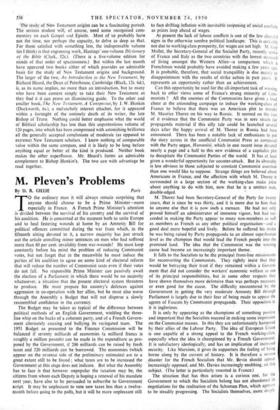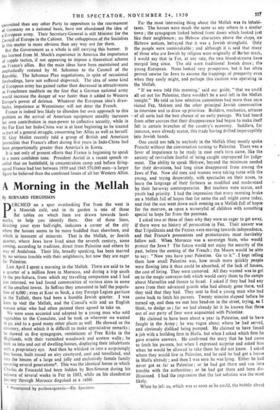M. Pleven's Problems
TO the ordinary man it will always remain surprising that anyone should choose to be a Prime Minister—more especially in France. A French Prime Minister's attention is divided between the survival of his country and the survival of his coalition. He is concerned at the moipent both to unite Europe and to heal festering wounds at home by an Amnesty Bill for political offences committed during the war from which, in the fifteenth sitting devoted to it, a narrow majority has just struck out the article annulling minor sentences on men who had suffered more than 80 per cent. invalidity from war-wounds! He must keep constantly before his mind the problem of reducing Communist votes, but not forget that in the meanwhile he must induce the patties of his coalition to agree on some kind of electoral reform that will reduce the number of Communist seats even if their votes do not fall. No responsible Prime Minister can passively await the election of a Parliament in which there would be no majority whatsoever, a situation that the present electoral system threatens to produce. He must prepare his country's defences against aggression in co-operation with her allies, but he must also nurse through the Assembly a Budget that will not disperse a slowly reassembled confidence in the_ currency. The Budget may be taken as typical of the difference between political methods of an English Government, wielding the three- line whip on the backs of a coherent party, and of a French Govern- ment alternately coaxing and bullying its variegated team. The 1951 Budget as presented to the Finance Commission will be balanced if seventy milliards of economies (a milliard francs is roughly a million pounds) can be made in the expenditure as pro- poted by the Government, if 200 milliards can be raised by fresh taxes and 320 milliards can be borrowed. The economies (which appear on the revenue side of the preliminary estimates) are to a great extent still to be found; what taxes are to be increased the Government at this stage does not indicate. But what the Assembly has to face is that however unpopular the taxation may be, the citizens from whom each Deputy is hoping a renewal of his mandate next year, have also to be persuaded to subscribe to GovernMent script. It may be unpleasant to vote new taxes less than a twelve- month before going to the polls, but it will be more unpleasant still to face drifting inflaticin With, inevitable -recipening of secial conflicts as prices leap ahead of Wages. At present the lack of labour conflicts is one of the few cheerful signs in the otherwise sombre political landkape: This is certainly not due to working-class prosperity, for wages are not high. M. Guy Mollet, the Secretary-General of the Socialist Party, recently spoke of France and Italy as the two countries with the lowest Standatd of living amongst the Western Allies—a comparison which a Frenchman would probably have avoided making a few years ago. It is probable, therefore, that social tranquillity is due mainly to disappointment with the results of strike action in past years. It represents an opportunity rather than an achievement. Can this opportunity be used for the all-important task of winning back to other views some of France's strong minority of Com- munists ? All the enemies of the Communists have given a loud cheer at the astounding campaign to induce the working-class of France to believe that there was an American plot to murder M. Maurice Thorez on his way to Russia. It seemed on the face of it evidence that the Communist Party was in sore straits for propaganda material if this silly tale could be launched several days after the happy arrival of M. Thorez in Russia had been announced. There has been a notable lack of enthusiasm to put the story across in the unofficial Communist Press as compared with the Party organ, Humanite, which in one recent issue devoted nearly a page and a half to this new evidence of a capitalist plot to decapitate the Communist Parties of the world. It has at least given a wonderful opportunity for counter-attack. But its absurdity is less obvious to those subjected to constant Communist assertion than one would like to suppose. Strange things are believed about Americans in France, and the affection with which M. Thorez is surrounded in a large section of the working-class make jokes about anything to do with him, now that he is a smitten man, double-edged. M. Thorez had been Secretary-General of the Party for twenty years, that is since he was thirty, and it is more due to him than to anyone else that it is now such a menace. He had not only proved himself' an administrator of immense vigour, but had suc- ceeded in making the Party appear to many non-members as well as members as French as any other political organisation—and a good deal more hopeful and lively. Before he suffered his stroke he was being raised by Party propaganda to an almost superhuman level as the champion that would lead the French people into the promised land. The idea that the Communist was the winning cause had become an increasingly important theme. It falls to the Socialists to be the principal front-line missionaries for reconverting the Communists. They rightly insist that they would be betraying their trust if they remained within a Govern- ment that did not consider the workers' economic welfare as one of its principal responsibilities, but in some other respects they have shown themselves more defensive than was perhaps necessary or even good for the cause. The difficulty encountered by the Government in getting the very moderate Amnesty Bill through Parliament is largely due to their fear of being made to appear the agents of Fascists by Communist propaganda. Their opposition tc it is inglorious. It is only by appearing as the champions of something positixe and important the Socialists succeed in making some impression on the Commgnist masses. In this they are unfortunately hampered by their allies of the Labour Party. The idea of European Union is one capable of a strong appeal to the French working-class, especially when the idea is championed by a French Government. It is satisfactory ideologically, and has an implication of increased security. Like Marxism, it gives its supporters the feeling of being borne along by the current of history. It is therefore a serious disaster for the French Socialists that Mr. Bevin should appear increasingly opposed, and Mr. Davies increasingly snubbing, on this subject. (The latter is particularly resented in France.) The situation that has thus arisen is a curious one, for the Government to which the Socialists belong has not abandoned its negotiations for the realisation of the Schuman Plan, which appears to be steadily progressing. The Socialists themselves, more deeplY committed than any other Party to opposition to the rearmament of Germany on a national basis, have not abandoned the idea of European army. Their Secretary-General is still Minister for the council of Europe in the Cabinet. The unhappiness of the Socialists M this matter is more obvious than any way out for them.
But the Government as a whole is still carrying this banner. It has learned from M. Moch's experience in America the importance of supple tactics, if not appearing to impose a theoretical scheme on France's allies. But the main ideas have been maintained and emphatically restated by M. Schuman to the Council of the Republic. The Schuman Plan negotiations, in spite of occasional forebodings, have' not suffered shipwreck. The idea of some kind of European army has gained rather than decreased in attractiveness as Frenchmen meditate on the fear that a German national army would increase the danger of war faster than it added to Western Europe's power of defence. Whatever the European idea's draw- backs, impatience at Westminster, will not deter the French. France is indeed less likely to abandon her own approach to this problem as the arrival of American equipment steadily increases her own contribution in man-power to collective security, while in the Far East her Indo-China war is at least beginning to be treated as part of a general struggle, concerning her Allies as well as herself. M. Guy Mollet recently told a group of British and American journalists that France's effort during five years in Indo-China had been proportionally greater than America's in Korea.
It is not only of present efforts that France is beginning to speak in a more confident tone. President Auriol in a recent speech re- called that on battlefield, in concentration camp and before firing- squad France had lost between 1939 and 1945 576,000 men—a larger figure he believed than the combined losses of all her Western Allies.















































































 Previous page
Previous page